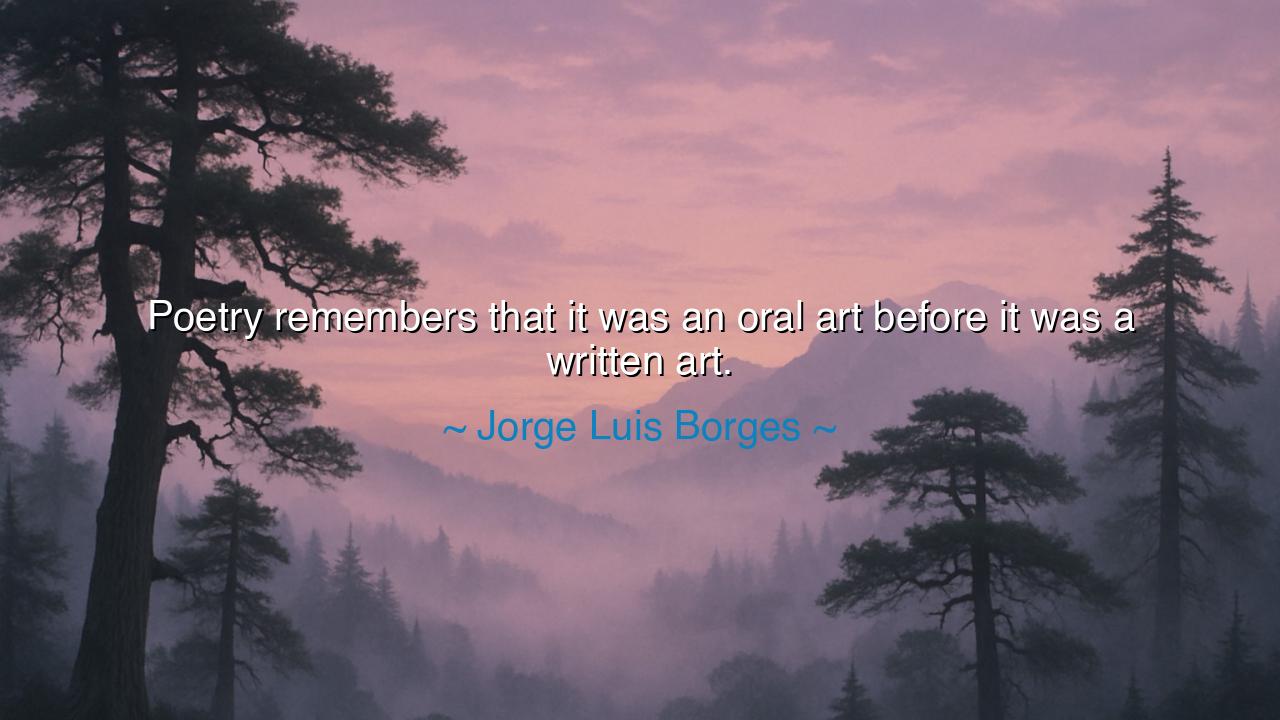
Poetry remembers that it was an oral art before it was a written






Hear, O children of memory and song, the wisdom of Jorge Luis Borges, who declared: “Poetry remembers that it was an oral art before it was a written art.” These words pierce like a flame into the darkness of forgetfulness, reminding us that poetry was born not in the silence of ink and parchment, but in the living breath of human voices. Before alphabets carved their symbols, before scrolls and books bound thought in paper, poetry was the chant around the fire, the rhythm of labor, the song of battle, the lullaby of mothers. It was a living current passed from tongue to ear, from generation to generation, woven into the very breath of humanity.
For when poetry first arose, men and women had no written signs. They carried their history, their laws, their dreams in stories and chants. The ancient Homeric epics, the Iliad and the Odyssey, lived in the mouths of bards who recited them across the Greek world, not as fixed texts but as living performances, reshaped by memory, rhythm, and occasion. So too in other lands: the Vedas in India, spoken in holy chants for centuries before being written; the sagas of the Norse, sung in halls of fire and ale; the griots of Africa, who preserved the histories of kings and warriors in their voices. Poetry was once the keeper of knowledge, the guardian of memory, the living library of nations.
Borges, master of labyrinths and dreams, knew this truth well. He saw that poetry even today carries within it the echo of its first form. Why do verses cling to rhythm and rhyme, to meter and cadence? It is because they were shaped for the ear, not the eye. They were made to be remembered, recited, and lived aloud. The written page is a later vessel, but the essence of poetry is in the breath, the sound, the chant that unites bodies in shared experience. Even silent reading, if one listens deeply, still carries the heartbeat of speech.
Consider the example of Martin Luther King Jr., whose speeches were not mere political declarations but living poetry, chanted into the soul of a nation. His “I Have a Dream” speech drew upon biblical cadences, prophetic rhythms, and the oral traditions of Black churches. It was poetry reborn as prophecy, moving the multitude not only with ideas but with sound, music, and spirit. Though written words preserve it today, its true power lay in its original form—spoken into the air, stirring hearts as living fire. This is the power Borges points us toward.
The danger of forgetting this truth is to reduce poetry to a cold, silent art, confined to pages and analyzed only by scholars. When we treat it only as written artifact, we strip it of its primal force. For poetry was never meant to be caged in stillness; it is breath, it is rhythm, it is the thunder of voices together. To forget its oral roots is to cut off its lifeblood. To remember them is to restore poetry to its true nature: communal, alive, transformative.
Therefore, O seekers, let this be your lesson: do not read poetry only with your eyes—read it with your lips, with your voice, with your heart. Speak it aloud, chant it as the ancients did, let its rhythm inhabit your breath. In gatherings, share verses with one another, let poetry once again be a fire at the center of the circle. For in speaking it, you awaken its soul; in hearing it, you let it do what it was born to do: bind hearts, carry memory, awaken spirit.
And so, remember Borges’s charge: poetry is first and foremost an oral art. The page is a vessel, but the voice is its life. Tend to this truth in your own practice: let your speech be alive with poetry, let your ears be open to its music, let your gatherings be kindled by its flame. For in remembering its origin, you not only honor the past—you restore the living power of poetry to shape the present and guide the future. This is the heritage left in your care: to keep poetry breathing.






SNSoi nank
Borges’ quote about poetry being an oral art first makes me question how we engage with poetry today. We often read poetry silently, yet so many famous poems were originally meant to be heard. I wonder if we’ve lost something important in the shift to written forms. Should we be more conscious of how we read poetry, perhaps reading it out loud to reclaim some of that original rhythm and energy?
BCBao Chau
Borges’ idea that poetry remembers its oral roots makes me reflect on how much of the poem’s impact depends on the delivery. When we recite a poem, it takes on a new life, a different rhythm. How much of this ‘oral’ influence do we still carry today, even in written forms? Is the experience of poetry truly complete without hearing it, or can the written word stand on its own?
NLMinh Nam Le
I love the way Borges highlights poetry’s oral history. There’s something magical about the way oral traditions hold stories and emotions, creating a rhythm that’s almost lost when poetry is written down. I wonder, does the essence of a poem change when it’s read aloud versus read in silence? Does hearing it aloud bring the poem to life in a way that the written word alone can’t capture?
PALe Phuong Anh
Borges’ observation about poetry’s oral roots is fascinating. It makes me think about the way poetry was originally shared in communities, passed down through generations through spoken word. I wonder—how much of the power of poetry is lost when it is only read on a page and not heard aloud? Could this be why certain poems seem to resonate more when performed or recited, rather than just silently read?